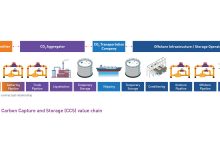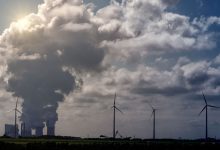IPCC Report: New Warnings on Global Warming
Romania’s Presidency Gives the Signal of Starting the Battle Against Climate Change
According to the latest report of the Intergovernmental Panel on Climate Change (IPCC), issued at the end of last year, global warming causes ever-increasing and, in some cases, irreversible changes in rainfall, ocean and wind patterns in all parts of the world. For Europe, the report provides for an increase in the frequency and intensity of extreme weather phenomena, including marine heat waves, and warns that a 2°C rise in temperature will have critical effects for nature and people. Rising temperatures and intensification of weather phenomena will also generate huge costs for the EU economy and affect the countries’ capacity to produce food, shows the report of the Intergovernmental Panel, an international body for the assessment of climate change, established in 1988 by the World Meteorological Organization (WMO) and the United Nations Environment Program (UNEP).
World’s Air Pollution: Real-time Air Quality Index >>>https://waqi.info/
Immediate, rapid, and large-scale reduction of greenhouse gas emissions and reaching a net level of CO2 emissions equal to zero have the potential to limit climate change and their effects, the IPCC report also shows. In April 2021, the Council of the European Union and the European Parliament reached a provisional agreement on the European Climate Law, which aims to transpose into law the objective of cutting emissions for 2030, being adopted by the EU ministers in June 2021. The European Climate Law, which is a focal point of the European Green Deal, transposes the EU’s political commitments on climate into a legal obligation, according to the Council of the European Union. This legislative act will set the framework for actions to be taken by the EU and its member states for the gradual reduction of emissions and, in the end, reaching EU’s climate neutrality by 2050. To align with the new standards in the field, a climate committee has recently been established in Romania.
Working Group on climate change
Romania’s President Klaus Iohannis has decided to set up a working group on climate change at the level of the Presidential Administration, in order to develop a “framework for an integrated approach to climate change in Romania”. The working group brings together national and international experts, prestigious members of the academic community in the country and abroad, representatives of public institutions, environmental, financial, and economic NGOs, “with solid experience in the field of climate change”, reads a statement of the Presidential Administration. Therefore, several key priorities will be identified for Romania in fighting climate change, in the medium and long term, and the results will be constantly presented to the public and sent to the Government to contribute to the substantiation of national strategies and plans on climate change, which must be completed by the Government in the period 2022-2023.
“The effects of climate change are increasingly visible in Romania and internationally, whether we are talking about intense heat waves, drought that destroys agricultural production, floods or threats to biodiversity caused by wildfires. In 2021, our country faced a record number of immediate severe weather warnings (code red) issued by the National Meteorological Administration, and experts warn that they will become more frequent in the context of climate change. The Intergovernmental Panel on Climate Change of the UN published last summer new data indicating the acceleration of climate change and the need for firm action. In response to these developments, at the global climate change conference in Glasgow, COP26, in November 2021, the states have taken additional commitments to reduce greenhouse gas emissions. These commitments will require the implementation of new measures and policies to reduce emissions. At European Union level, the Fit for 55 Package is currently discussed and negotiated, containing a few measures meant to reduce emissions by 2030. We are therefore going through a period of readjustment of international and European climate priorities and policies, to which Romania is a party”, the quoted statement also shows.
“Green transition can generate for Romania and Romanians not only a clean and healthy environment, the prevention of extreme weather phenomena and related natural disasters, but also wide access to clean energy, green economic growth and new jobs. To benefit from the positive effects of the green transition, we need to harmonize various interests within an integrated, science and expertise-based approach, in response to COP26 and the Fit for 55 Package. The working group established at the level of the Presidential Administration is meant to support this national approach”, the Presidential Administration also reports.
Adoption of the air pollution control program postponed
Romania has a major problem with air pollution and, despite the warnings coming from Brussels, Bucharest authorities have done too little to correct the situation. Under these circumstances, Romania was twice referred, on December 2 last year, to the Court of Justice of the European Union (CJEU). The European Commission has decided to make these decisions on the one hand for failure to comply with the EU rules on combating industrial pollution and on the other hand for failure to fulfil the obligation to adopt an air pollution control program. The Industrial Emissions Directive establishes rules designed to prevent and reduce harmful industrial emissions to air, water, and soil and to prevent the generation of waste. Member States are also required to develop, adopt, and implement national air pollution control programs and to report annually on these pollutants.
More than two years of delay
Romania should have submitted to the European Commission its first national air pollution control program by April 1, 2019, but that program hasn’t been adopted to date. The decision to refer Romania to the CJEU was made, in this case, after the Commission addressed to the country a letter of formal notice in July 2018, an additional letter of formal notice in July 2019 and a reasoned opinion in July 2020. On the second case, before referring Romania to the Court of Justice, the Commission had sent a letter of formal notice in February 2020 and a reasoned opinion in October 2020. Although they should have complied with EU law after these warnings, according to custom, Victoria Palace officials preferred to ignore them.
What are the risks for the EU states that fail to comply with the directives?
The penalties that the Commission may propose to the CJEU are as follows:
- A lump sum of at least EUR 1,643,000
- Penalties between EUR 1,985 and EUR 119,125 per day of delay after the judgment of the EU court.
The CJEU may impose such penalties on the Member State concerned, and so far, Romania has managed to avoid this. According to standard procedures, if a country fails to comply with the European law, the European Commission triggers the infringement proceedings. The EC then sends a letter of formal notice requesting the country concerned to submit observations on the infringement within a maximum of two months. If it receives an unsatisfactory reply or no reply, the Commission sends a reasoned opinion stating the reasons why it considers that the Member State has infringed EU law. If it still receives an unsatisfactory reply or no reply, the Commission asks the Court to open the litigation proceedings. However, it rarely goes that far. In recent years, over 85% of cases have been resolved in the phases preceding this stage.
Drown in dust and robbed of years of life
According to recent estimates by the European Environment Agency (EEA), from the perspective of years of life lost as a result of exposure to PM2.5 per 100,000 inhabitants, Romanians lost 1,261 years in 2019. In this chapter, Romania is outrun only by Bulgaria, with 1,606 years, and by Poland, with 1,291 years. Although Romania has had, for several years, air quality management plans at the level of each county, the EEA report confirms that authorities do too little to reduce air pollution. For example, Western countries manage to expose their citizens much less to PM2.5 particulate matter. Thus, Germany can boast that it totalled only 676 years of life lost per 100,000 inhabitants, France – 554, Italy – 843, and Spain – 561. PM2.5 particulate matter is a complex mixture of very small particles and liquid droplets, with an annual target value of 25 µg/m3.
Higher fines for polluters
Being in infringement procedure, the former Cîţu Government decided last summer to propose a substantial increase in the fines that will be applied to the economic operators that pollute by amending and supplementing Law no. 278/2013 on industrial emissions. In the letter of formal notice sent by the European Commission on this issue in February 2021 it was shown that “the Romanian legal system fails to guarantee the implementation of the key objectives of the Directive, in particular that installations must only be allowed to operate if they have permits. On the one hand, the Romanian legal system, in its current state, introduces very low and inadequate penalties, which fail to ensure effectiveness, proportionality and dissuasiveness as required by the Directive. On the other hand, the Romanian authorities fail to implement the existing legislation in a coherent manner on an administrative level (e.g., suspend the operation of installations without permits), while the Romanian judiciary fails to enforce the sanctions”.
Penalty of imprisonment
With the entry into force of the expected amendments, the violation of environmental regulations will be penalized with fines ranging from RON 50,000 to RON 500,000, while it is now penalized with fines from RON 20,000 to RON 100,000. The new legislation will also provide for penalty of imprisonment, of six months to three years if the operation of any installation was likely to endanger human or animal life or health or the flora. It will also provide for the same penalty of imprisonment, from three months to one year, or a fine if the danger is caused by the modification of the installations without having an integrated environmental permit/environmental permit that includes the operating conditions after those modifications.
Green procurement, ignored by authorities
Although the European Union requires member states that at least 50% of all public procurement be green, and in Romanian law there is even an order from 2018 that requires public authorities to comply with a number of minimum environmental requirements for six categories of products and services, the pace of this type of procurement is extremely slow compared to the urgency with which measures on climate neutrality measures need to be implemented. The conclusion appears in the study on Green Public Procurement in Romania, conducted by ARDLD – Romanian Association for Sustainable Local Development -and ONV LAW, which was published last summer. On the other hand, Romania remains among the last three states in Europe (along with Luxembourg and Hungary) that have not yet adopted or at least published a National Action Plan for Green Public Procurement, “which explains the low degree of implementation by authorities of green public procurement obligations”, consider the authors of the IPCC report.
Strategy for a cleaner air in Bucharest
The Integrated Air Quality Plan (IAQP) in Bucharest will be developed by a consortium of four companies, including Cambridge Environmental Research Consultants. “Among them, Cambridge Environmental Research Consultants has conducted air quality assessment and air quality improvement projects for, among others, London, but also for the capital of Ireland, Dublin, as well as throughout the Republic of Ireland. The project signed with the Municipality lasts 12 months and involves the study on air quality in Bucharest (the main pollutants) and the Integrated Air Quality Plan (plan of measures),” announced the general mayor of the Capital, Nicuşor Dan.
Network of microstations for air quality monitoring in Ploiești
In the context of the efforts made by local administrations to reduce pollution, there is also the recent initiative of Ploiești Municipality, which put into operation a network of microstations with sensors for determining/monitoring air quality indicators. According to the municipality, the network consists of 16 microstations with sensors that can measure at least 12 parameters, including temperature, pressure, humidity, volatile organic compounds, noise level, sulphur dioxide, nitrogen dioxide etc., the data collected following to be transmitted in real time as the sensors are connected to the internet. Citizens can access the interactive map of the microstations on the website of the municipality www.ploiesti.ro, at the following link: http://www.ploiesti.ro/calitateaer.php
The computer system will record and store the data, will allow the creation of the analytical database, the creation of specific reports for each indicator and/or cumulative for each microstation, in continuous regime. The presentation of the results will be done in a tabular format and/or as a chart, following that the values recorded by the sensors be stored in order to be able to generate analysis reports for different periods of time, depending on the user’s selection.







